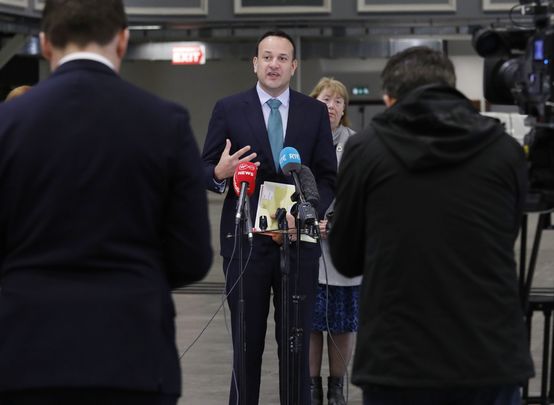Taoiseach (Prime Minister) Leo Varadkar has said it may take “months not weeks” for life to return to normal in the coronavirus crisis.
Speaking at government buildings just days after his government’s new tough measures which operated from midnight last Friday, he said, “We do not know for sure. Some of the estimations we had -- two or three weeks for instance -- no longer apply.
“We won’t be at a case where I can go on TV and say everything is going back to where it was on the 11th of March. We’ll reach the point where we can start to ease some of the restrictions and see what happens.”
Read more: Coronavirus live updates
Varadkar said there would come a point when we “pass the peak” and some of the restrictions could be eased but it may take “months, not weeks.”
His new rules ordered people to stay at home in virtually all circumstances. All public and private gatherings were banned for two weeks, more non-essential shops and services were closed, non-essential surgery stopped and a ban on visiting hospitals and other healthcare settings was imposed except on compassionate grounds.
Taoiseach Leo Varadkar outlines further Covid-19 measures, says everybody must stay at home from midnight tonight until Easter Sunday, 12 April | Follow live updates: https://t.co/W2t5MvPevS pic.twitter.com/dx5HbeKts6
— RTÉ News (@rtenews) March 27, 2020
The only exceptions to the stay-at-home rule are for travel to health, social care or other essential work, shopping for food and takeaways, medical appointments and for “vital family reasons” such as providing care.
People are limited to taking “brief, individual” physical exercise within two kilometers of their home.
The lockdown – Varadkar continued to refuse to use the description but the general public does – also ordered over-70s and persons with underlying health problems to remain in their properties. They are not allowed to travel more than two kilometers from their homes and must rely on online shopping deliveries or neighbors and relatives and charity agencies to collect their groceries.
Read more: Heartbreak as Irish husband and wife die just days apart
Tougher measures are expected later this week. Cities and towns in Ireland are now quieter than Christmas Day.
The latest coronavirus figures on Tuesday morning showed 54 Covid-19 deaths and 2,910 confirmed cases in the Republic, and 22 people died in Northern Ireland and there were 533 confirmed cases.
That brought the total for all Ireland to 76 deaths on Tuesday morning and 3,443 confirmed cases.
The confirmed cases included Ireland’s top broadcaster Ryan Tubridy who has a daily RTE radio program and hosts The Late, Late Show on TV every Friday evening.
Medical chiefs in the Republic were quietly confident the new measures are effective. They pointed out that before restrictions were in place, the daily growth rate of confirmed cases was at 33 percent. This had fallen in recent days to around 15 percent.
But they acknowledged it would take another six to nine days before there was a “reliable picture” of how effective measures to slow the spread of the virus had been.
Dr. Tony Holohan, the Republic’s chief medical officer said, “We are beginning to see encouraging signs in our efforts to flatten the curve. However, we cannot become complacent as we are still seeing new cases and more ICU admissions every day.”
Dr. Tony Holohan, the Republic’s chief medical officer.
Meanwhile, Northern Ireland public health specialist Dr. Gabriel Scally warned that Ireland’s geographical advantage is being “squandered” by differing approaches to the public health crisis north and south.
He said, “Historically islands have advantages when dealing with epidemics. For example, avoiding importation of new cases by controlling movement to and from the island is comparatively simple.
“However, in this coronavirus pandemic, Ireland’s geographical advantage is being squandered by the adoption of very different approaches to dealing with the disease.”
Scally said the advice to someone in Lifford, Co. Donegal, with symptoms of the disease was to self-isolate for a minimum of 14 days. A stone’s throw away in Strabane, Co. Tyrone, the advice was isolation for seven days.
Read more: Ireland to launch app to track and trace Covid-19 infections




Comments